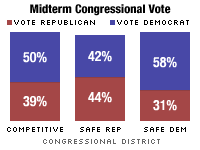While it is commonly accepted that unscientific polling does not yield any valid results and is strictly for entertainment purposes, people’s opinion of the validity of professionally done scientific polling has hardly reached consensus. In fact, there is much individual ambivalence over the matter. Many people, on the one hand, are very cynical, verbally acknowledging the notorious inconclusiveness of poll results but at the same time seem to be infatuated with what the polls seem to indicate/predict. This holds particularly true with politicians, for whom public opinion is vital (think President Bush- claiming to have no faith in the authenticity of polls, but on the other hand having someone like Karl Rove around who tends have a “voracious appetite” for poll results.)
What is it about polls that makes them so controversial?
Take the following poll report:
"Democrats Hold Double Digit Lead in Competitive Districts. "

Let us first examine a series of facts, such as who conducted the poll, who it was sponsored by, why and how and when was this poll taken.
People-press poll reports that Democrats hold a double digit lead in competitive districts. Pew Research Center, an independent opinion research group, part of Princeton Research Associates is sponsored by the Pew Charitable Trusts. Surveys are one of the seven projects that make up the Research Center with the purpose of evaluating ideas on the media and public policy through public opinion research; the information produced is available at no charge.
Princeton Research Associates conducted this poll between October 17-22, 2006 on 2,006 adults, 18 years or older. The Associates attests with 95% confidence, that the error attributable to sampling is plus or minus 2.5 percentage points, and 3 % based on registered voters.
This is standard and acceptable in terms of margin of error, and so is a 95% confidence level and the organization behind the poll seems hardly biased or in it for partisan purposes. If this poll is accurate, it could suggest a number of very valuable pieces of information and with about a week to go to the midterm elections, knowing who is going to win the election is very significant to political leaders, journalists, scholars, and public interest organizations.
However, even if a poll is conducted scientifically it is only valid to a certain extent. Any given poll can be off by fifteen percent, and one has no way of knowing of this particular poll is part of that 5% an dis producing highly inaccurate results. In addition, polls can only be used to reflect large shifts in public opinion, like double digit changes, but by no means capable of measuring the tiny nuances and subtle changes among potential voters. These seemingly small percentages can be highly significant when measuring public opinion with issues that the nation tends to be close to equally split upon- although here it is not the case-it would then be almost impossible to accurately predict the actual state of public opinion. However, poll results don’t usually provide this valuable piece of information.
Public opinion also tends to highly volatile but as volatile as public opinion can be a lot of the fluctuations can be attributed to the way a specific poll is conducted.
For instance, the time of day, the days of the weeks are seemingly innocuous factors but they can create huge discrepancies between one poll results. (Thursday through Saturday is when young adults tend to be out partying or clubbing, and recent trends indicate they tend to vote Democratic.) With any given poll, no matter how scientific there are always barriers taht can obscure results. Factors such as language comprehension, the tendency of people not to respond they don’t know, and the fact that most people don’t have a real opinion on a given issue(and actually may form their opinion based on the way the question was asked) aren't really taken into account. There is an element of people wanting to provide the more “popular” answer, and not professing support for a losing candidate.
Even if public opinion was reflected upon in the poll, it is by no means indicative what the voting results will be. Many pollsters have different definitions of “likely voters” and even if it was more standardized they can still never accurately predict who will vote. A series of factors varying from weather conditions and other random factors can have an enormous impact on people’s individual decision whether to vote or not. In addition newly registered voters must be accounted for in the pollster’s assessment of “likely voters” but it is unclear who from the registered 18-21 age group is actually going to vote. There is also evidence of growing voter cynicism; this overall dissatisfaction may stem from a series of factors such as the pervasiveness of ridiculous campaign ads, negative media coverage, too much mention of scandals and corruption etc, and so although they may have professed support for a particular party or candidate they may end up staying home. Another important thing to note is that in this poll, people are being asked to profess their support for a one party over another, not for a specific candidate. Ever heard of the notorious love-hate relationship people have with congress? So while they may be strongly dissatisfied with a party overall, they may vote for the individual candidate anyway.
So in reality you can’t accurately conclude much from a poll. It is hardly a systematic and scientific way of attaining information, and in order really draw a valid conclusion the evidence must be absolutely precise. So, the only thing you can really conclude from this poll, is that the two thousand people or more who were polled responded in a way that seems to favor the Democratic party.